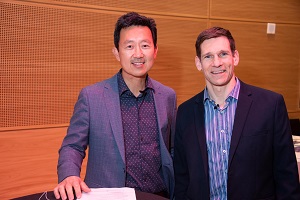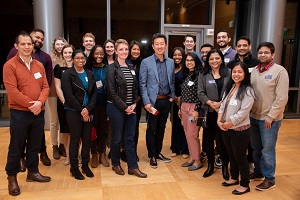Impactful Insights: Chris Suh, Chief Financial Officer at Electronic Arts

Chris Suh speaks to students at The Hub.
In early April, newly minted Chief Financial Officer of Electronic Arts (EA) and Technology Management MBA alumnus (TMMBA 2002), Chris Suh, generously shared his evening for an intimate Fireside Chat with students from the TMMBA, Hybrid MBA (HMBA), Executive MBA (EMBA), and Global Executive MBA (GEMBA) programs.
During the dynamic conversation, moderated by Tim Cooke (TMMBA 2006), attendees heard Chris’ perspectives on a range of topics – from his journey to the C-suite and key leadership principles to his thoughts on NFTs and his favorite piece of technology. (For the record, he now has five different gaming consoles!)
A Steady Climb to the Top
Chris started at EA in March 2022 after spending 25 years at Microsoft under the leadership of both Steve Ballmer and Satya Nadella. While there, he held a wide variety of senior roles including General Manager, Investor Relations, and GM/CFO for Global Mid-Market and Partner Channels.
From Chris’ view, his rise to the top took a “slow and steady wins the race” approach. In his early career, he didn’t focus on packing his bookshelf with awards and accolades. Instead, he prioritized learning new things and gaining new experiences. As he identified and evolved his greatest interests and strengths, Chris gradually narrowed his trajectory toward the CFO path.
When the timing, opportunity, and company dynamic was right, Chris decided to “take the leap” with EA. This decision was backed by the positive relationships he built with the EA senior leadership team during the recruitment process, a resurfaced passion he had for EA’s products (he was a big Madden player as a child) and a desire to help the company forge the future of gaming as that industry shifts to a live service model.
Guiding Leadership Principles

Chris Suh and Tim Cooke
During the Fireside Chat, Chris reflected on a few fundamental leadership practices he believes have been critical to his long-term success, including:
Be a Life-Long Learner
Make learning your competitive advantage. Expose yourself to new things, new people, new situations. Early in Chris’ career, he didn’t necessarily have a defining north star, but he did understand the importance of acting as the ‘forever student’ – in the informal and formal sense. He made it a point to learn something from everyone he worked with. To this day, Chris still utilizes core strategic frameworks he learned while in the TMMBA Program.
He said it’s also important to pay attention to your current work environment. Has your learning curve flattened? If so, this might be a sign that it’s time to make a change.
Keep it Simple
Technology and other advances have put so much information at our fingertips and more to absorb, analyze, and distill than ever before. Chris noted that, earlier in his career, he tended to share too much information with the intention of demonstrating his knowledge; for example, he’d pack presentations full of complicated data to try and get his point across.
Over time, he learned that a simple approach is more effective. It’s hard to make complex things simple – but effective leaders can do exactly that. And achieve greater impact by doing so.
Master Your Storytelling
Chris reflected that storytelling goes hand-in-hand with the practice of simplicity. Getting to the essence of what needs to be communicated will help you build trust and influence others and is an essential skill as you advance.
A leader’s level of focus — and ability to communicate this focus — is critical. If you can’t articulate your idea, then you won’t be able to let people in on your brilliance.
Bring Positive Energy (with Authenticity)
It doesn’t take years, months or even hours to establish an impression on someone. Typically, within the first five minutes of meeting someone, you can tell if you’ll enjoy working with them. So, keep this in mind – even with initial interactions with colleagues.
Furthermore, it’s not just enough to bring a positive energy, but to also be authentic in these relationships and in your approach to problem-solving. Chris noted the pandemic created a dynamic that either revealed leaders’ authenticity or the lack of it. In an evolving work environment, authentic leaders provide flexibility, understanding, and support for their teams, thus creating a culture where people can thrive.
To the EA Future and Beyond

Chris Suh and TMMBA students
As Chris looks to establish impact at EA, he intends to lead with these guiding principles to foster the long-term success of the organization, the empowerment of the employees and the needs of the customers.
After the Fireside Chat, several students shared their appreciation for Chris’ honesty, openness, and insights, as well as feeling encouraged to develop their authentic leadership styles.
This Fireside Chat is part of an ongoing EMBA, HMBA, TMMBA, and GEMBA Career Management series where students gain career insights and perspectives from leaders at some of the top organizations in the world.
